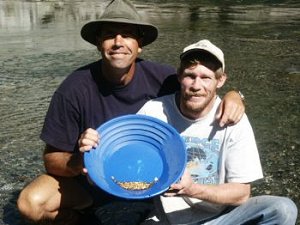By Dave McCracken
To succeed at gold dredging, you should be willing to take a rather athletic approach toward the work, especially during the sampling stages.
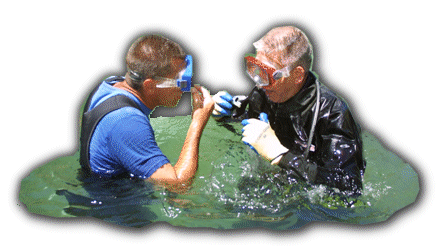
Gold dredging consists mostly of physical activity. Heavy gear has to be carried around from place to place. Much of your time is spent wrestling with a suction hose, picking up and tossing cobbles as fast as you can, shoving against boulders, fighting to hold your position against the water’s current, packing 60-plus pounds of lead around your waste, swimming back and forth across the river, and pulling dredges around on ropes. There just never seems to be an end to the physical work! This is not bad. Unless you don’t like hard work.

If you have a distaste for hard, strenuous work, if you don’t enjoy it and are generally looking for ways to avoid it, you need to find some line of work other than gold dredging. To succeed at gold dredging, you should be willing to take a rather athletic approach toward work, especially during the sampling stages.
Some people are physically-inclined by nature, and they enjoy hard work. Other people are not so physically inclined, but they are willing to work hard and do whatever it takes to succeed. Such people can be very successful at gold dredging. But, no matter what your inclination, gold dredging requires hard work. There is no getting around it.
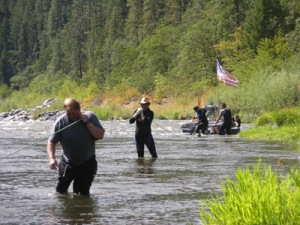 I have found, to be most effective, it is best to attack a gold-dredging operation with a rigid work schedule, just like any other job or business-activity. I personally prefer to “pour on the steam” for three straight days. Then, I take one day off from dredging to allow my body to recuperate. The work is physically exhausting on the body if you really pour out the energy. You need to find the appropriate rest-interval that works best for you. Otherwise, your body will get overworked and start breaking down. I use my day-off to perform gear maintenance and the many other miscellaneous chores that are needed to keep the operation running smoothly. I try to get some much-needed free time out of it, as well.
I have found, to be most effective, it is best to attack a gold-dredging operation with a rigid work schedule, just like any other job or business-activity. I personally prefer to “pour on the steam” for three straight days. Then, I take one day off from dredging to allow my body to recuperate. The work is physically exhausting on the body if you really pour out the energy. You need to find the appropriate rest-interval that works best for you. Otherwise, your body will get overworked and start breaking down. I use my day-off to perform gear maintenance and the many other miscellaneous chores that are needed to keep the operation running smoothly. I try to get some much-needed free time out of it, as well.
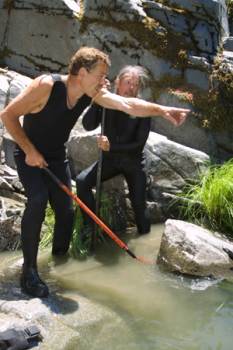
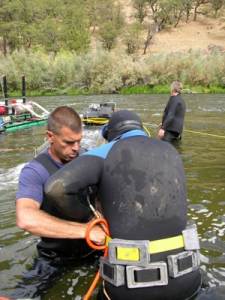
My approach is not the only way. I know successful gold dredgers who prefer to work fewer hours each day, or work at a less-intense level of physical activity; but they put in five or six straight days at a time. If we could add up the total units of energy expended on dredging, it would probably come out about the same, either way. It is just a matter of preference and what pace you are most comfortable with. The main point here is that no matter how you cut it, you’ve got to put in the dredging hours if you want to succeed at underwater mining.
When people ask me about gold dredging as a profession, I always answer as follows: “Given the knowledge of how to do it, and the willingness to apply the knowledge, gold dredging is an easy way to make a living, if you are willing to work hard at it.” And, this is the simple truth.
- Here is where you can buy Gold Prospecting Equipment & Supplies.
- Here is where you can buy a sample of natural gold.
- Suction Dredging for Gold
- Fast Water Dredging
- Production Gold Dredging
- Tuning Into the Wavelength of Success
- Never Give Up Hope!
- Schedule of Events
- Books & Videos by this Author


